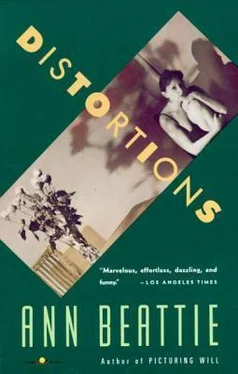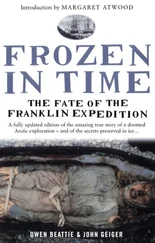Ann Beattie - Distortions
Здесь есть возможность читать онлайн «Ann Beattie - Distortions» весь текст электронной книги совершенно бесплатно (целиком полную версию без сокращений). В некоторых случаях можно слушать аудио, скачать через торрент в формате fb2 и присутствует краткое содержание. Год выпуска: 1991, Издательство: Vintage, Жанр: Современная проза, на английском языке. Описание произведения, (предисловие) а так же отзывы посетителей доступны на портале библиотеки ЛибКат.
- Название:Distortions
- Автор:
- Издательство:Vintage
- Жанр:
- Год:1991
- ISBN:нет данных
- Рейтинг книги:5 / 5. Голосов: 1
-
Избранное:Добавить в избранное
- Отзывы:
-
Ваша оценка:
- 100
- 1
- 2
- 3
- 4
- 5
Distortions: краткое содержание, описание и аннотация
Предлагаем к чтению аннотацию, описание, краткое содержание или предисловие (зависит от того, что написал сам автор книги «Distortions»). Если вы не нашли необходимую информацию о книге — напишите в комментариях, мы постараемся отыскать её.
Distortions — читать онлайн бесплатно полную книгу (весь текст) целиком
Ниже представлен текст книги, разбитый по страницам. Система сохранения места последней прочитанной страницы, позволяет с удобством читать онлайн бесплатно книгу «Distortions», без необходимости каждый раз заново искать на чём Вы остановились. Поставьте закладку, и сможете в любой момент перейти на страницу, на которой закончили чтение.
Интервал:
Закладка:
My lack of faith in Noel has made him unhappy. He leaves the room without answering. He probably remembers — and knows that I remember — the night he asked David if he could see what was wrong with the socket of his floor lamp. David came back to our apartment laughing. “The plug had come out of the outlet,” he said.
In early April, David comes to visit us in Vermont for the weekend with his girlfriend, Patty. She wears blue jeans, and has kohl around her eyes. She is twenty years old. Her clogs echo loudly on the bare floorboards. She seems to feel awkward here. David seems not to feel awkward, although he looked surprised when Beth called him David. She led him through the woods, running ahead of Noel and me, to show him the waterfall. When she got too far ahead, I called her back, afraid, for some reason, that she might die. If I lost sight of her, she might die. I suppose I had always thought that if David and I spent time together again it would be over the hospital bed of our dying daughter — something like that.
Patty has trouble walking in the woods; the clogs flop off her feet in the brush. I tried to give her a pair of my sneakers, but she wears size 8½ and I am a 7. Another thing to make her feel awkward.
David breathes in dramatically. “Quite a change from the high rise we used to live in,” he says to Noel.
Calculated to make us feel rotten?
“You used to live in a high rise?” Patty asks.
He must have just met her. She pays careful attention to everything he says, watches with interest when he snaps off a twig and breaks it in little pieces. She is having trouble keeping up. David finally notices her difficulty in keeping up with us, and takes her hand. They’re city people; they don’t even have hiking boots.
“It seems as if that was in another life,” David says. He snaps off a small branch and flicks one end of it against his thumb.
“There’s somebody who says that every time we sleep we die; we come back another person, to another life,” Patty says.
“Kafka as realist,” Noel says.
Noel has been reading all winter. He has read Brautigan, a lot of Borges, and has gone from Dante to García Márquez to Hilma Wolitzer to Kafka. Sometimes I ask him why he is going about it this way. He had me make him a list — this writer before that one, which poems are early, which late, which famous. Well, it doesn’t matter. Noel is happy in Vermont. Being in Vermont means that he can do what he wants to do. Freedom, you know. Why should I make fun of it? He loves his books, loves roaming around in the woods outside the house, and he buys more birdseed than all the birds in the North could eat. He took a Polaroid picture of our salt lick for the deer when he put it in, and admired both the salt lick (“They’ve been here!”) and his picture. Inside the house there are Polaroids of the woods, the waterfall, some rabbits-he tacks them up with pride, the way Beth hangs up the pictures she draws in school. “You know,” Noel said to me one night, “when Gatsby is talking to Nick Carraway and he says, ‘In any case, it was just personal’—what does that mean?”
“When did you read Gatsby?” I asked.
“Last night, in the bathtub.”
As we turn to walk back, Noel points out the astonishing number of squirrels in the trees around us. By David’s expression, he thinks Noel is pathetic.
I look at Noel. He is taller than David but more stooped; thinner than David, but his slouch disguises it. Noel has big hands and feet and a sharp nose. His scarf is gray, with frayed edges. David’s is bright red, just bought. Poor Noel. When David called to say he and Patty were coming for a visit, Noel never thought of saying no. And he asked me how he could compete with David. He thought David was coming to his house to win me away. After he reads more literature he’ll realize that is too easy. There will have to be complexities. The complexities will protect him forever. Hours after David’s call, he said (to himself, really — not to me) that David was bringing a woman with him. Surely that meant he wouldn’t try anything.
Charles and Margaret come over just as we are finishing dinner, bringing a mattress we are borrowing for David and Patty to sleep on. They are both stoned, and are dragging the mattress on the ground, which is white with a late snow. They are too stoned to hoist it.
“Eventide,” Charles says. A circular black barrette holds his hair out of his face. Margaret lost her hat to Lark some time ago and never got around to borrowing another one. Her hair is dusted with snow. “We have to go,” Charles says, weighing her hair in his hands, “before the snow woman melts.”
Sitting at the kitchen table late that night, I turn to David. “How are you doing?” I whisper.
“A lot of things haven’t been going the way I figured,” he whispers.
I nod. We are drinking white wine and eating cheddar-cheese soup. The soup is scalding. Clouds of steam rise from the bowl, and I keep my face away from it, worrying that the steam will make my eyes water, and that David will misinterpret.
“Not really things. People,” David whispers, bobbing an ice cube up and down in his wineglass with his index finger.
“What people?”
“It’s better not to talk about it. They’re not really people you know.”
That hurts, and he knew it would hurt. But climbing the stairs to go to bed I realize that, in spite of that, it’s a very reasonable approach.
Tonight, as I do most nights, I sleep with long johns under my nightgown. I roll over on top of Noel for more warmth and lie there, as he has said, like a dead man, like a man in the Wild West, gunned down in the dirt. Noel jokes about this. “Pow, pow,” he whispers sleepily as I lower myself on him. “Poor critter’s deader ’n a doornail.” I lie there warming myself. What does he want with me?
“What do you want for your birthday?” I ask.
He recites a little list of things he wants. He whispers: a bookcase, an aquarium, a blender to make milkshakes in.
“That sounds like what a ten-year-old would want,” I say.
He is quiet too long; I have hurt his feelings.
“Not the bookcase,” he says finally.
I am falling asleep. It’s not fair to fall asleep on top of him. He doesn’t have the heart to wake me and has to lie there with me sprawled on top of him until I fall off. Move, I tell myself, but I don’t.
“Do you remember this afternoon, when Patty and I sat on the rock to wait for you and David and Beth?”
I remember. We were on top of the hill, Beth pulling David by his hand, David not very interested in what she was going to show him, Beth ignoring his lack of interest and pulling him along. I ran to catch up, because she was pulling him so hard, and I caught Beth’s free arm and hung on, so that we formed a chain.
“I knew I’d seen that before,” Noel says. “I just realized where — when the actor wakes up after the storm and sees Death leading those people winding across the hilltop in The Seventh Seal.”
Six years ago. Seven. David and I were in the Village, in the winter, looking in a bookstore window. Tires began to squeal, and we turned around and were staring straight at a car, a ratty old blue car that had lifted a woman from the street into the air. The fall took much too long; she fell the way snow drifts — the big flakes that float down, no hurry at all. By the time she hit, though, David had pushed my face against his coat, and while everyone was screaming — it seemed as if a whole chorus had suddenly assembled to scream — he had his arms around my shoulders, pressing me so close that I could hardly breathe and saying, “If anything happened to you … If anything happened to you …”
When they leave, it is a clear, cold day. I give Patty a paper bag with half a bottle of wine, two sandwiches, and some peanuts to eat on the way back. The wine is probably not a good idea; David had three glasses of vodka and orange juice for breakfast. He began telling jokes to Noel — dogs in bars outsmarting their owners, constipated whores, talking fleas. David does not like Noel; Noel does not know what to make of David.
Читать дальшеИнтервал:
Закладка:
Похожие книги на «Distortions»
Представляем Вашему вниманию похожие книги на «Distortions» списком для выбора. Мы отобрали схожую по названию и смыслу литературу в надежде предоставить читателям больше вариантов отыскать новые, интересные, ещё непрочитанные произведения.
Обсуждение, отзывы о книге «Distortions» и просто собственные мнения читателей. Оставьте ваши комментарии, напишите, что Вы думаете о произведении, его смысле или главных героях. Укажите что конкретно понравилось, а что нет, и почему Вы так считаете.












